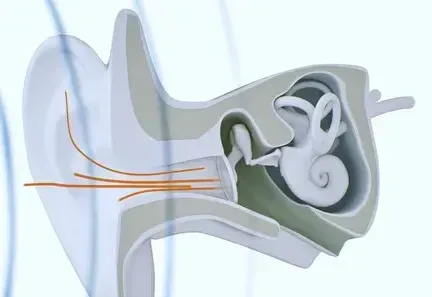Get ready to dive into the fascinating world of sound! Did you know that the volume of what you hear is measured in decibels (dB)? It’s incredible! Just think: the softest whisper registers at only 15-20 dB, while a roaring jet engine blasts in at a whopping 120 dB! The quietest sounds we can detect are referred to as thresholds. For adults, normal hearing thresholds range from 0-25 dB across various frequencies—how cool is that? Plus, as part of these exciting evaluations, we conduct speech tests to pinpoint exactly how well you can hear specific words. This is not just about understanding sound; it’s about uncovering the type of hearing loss you might be experiencing, whether it’s conductive, sensorineural, or mixed. Let’s embark on this auditory adventure together and unlock the mysteries of your hearing!
Conductive hearing loss
Conductive hearing loss is a type of hearing impairment that occurs when there is an issue with the transmission of sound to the inner ear and the cochlea, which is essential for hearing. This type of hearing loss can arise from various problems affecting the ear canal, eardrum (tympanic membrane), or the middle ear, which includes the ossicles and Eustachian tube. Importantly, the inner ear and auditory nerve remain intact in cases of conductive hearing loss.
Common symptoms experienced by individuals with conductive hearing loss may include a perception of sounds being muffled or significantly quieter than they should be.
Several factors may contribute to conductive hearing loss, including:
- Infections of the outer or middle ear
- Complete blockage of the ear canal due to earwax
- Deterioration of the bones in the middle ear (ossicles)
- Otosclerosis, which causes the ossicles to become fixed
- A perforated tympanic membrane, or a hole in the eardrum
- Absence of certain structures in the outer or middle ear
The duration of conductive hearing loss can range from temporary to permanent, largely depending on the underlying cause. In some instances, medical treatment can resolve the issue, while hearing aids or other amplification devices may be recommended for individuals with long-term or permanent conductive hearing loss.
Sensorineural hearing loss
Sensorineural hearing loss is defined as a type of hearing impairment that arises from dysfunction within the sensory receptors of the auditory system, particularly in the cochlea of the inner ear or along the auditory nerve pathways. This condition primarily results from abnormalities or damage to the hair cells located in the cochlea, which impedes the normal transmission of sound signals to the brain, leading to hearing difficulties.
Individuals experiencing sensorineural hearing loss may encounter a variety of symptoms, including muffled speech perception, the presence of tinnitus (ringing or buzzing in the ears), challenges in hearing amidst background noise, and difficulty understanding speech clearly.
Several factors can contribute to the development of sensorineural hearing loss, including:
- Congenital Causes: Some individuals are born with abnormalities in their hair cells, resulting in congenital sensorineural hearing loss.
- Damage to Hair Cells: This can occur due to various reasons, such as genetic predispositions, infections, ototoxic medications, traumatic injuries, or prolonged exposure to loud noises, leading to late-onset or acquired hearing loss.
- Presbycusis: This refers to age-related hearing loss, a common condition among older adults.
Sensorineural hearing loss is typically permanent and may either remain stable or progressively worsen over time. Regular hearing assessments are essential for monitoring the condition. Hearing aids represent the most prevalent and effective treatment option, as they enable hearing professionals to tailor their settings to accommodate changes in the individual’s hearing needs.
Early Signs of Hearing Loss
Recognizing the signs of hearing loss for you or your family member will help in being proactive. Knowing the symptoms and signs is an important first step towards correcting your hearing loss.
Conversations
Do you have difficulty following conversations? Have you noticed you have to ask people to repeat themselves in large groups?
Phone Conversations
Do you struggle to understand phone conversations, frequently asking for repetitions even in quiet situations?
People just mumbling?
Do people sound like they are mumbling when you are having a conversation more often than before?
Locating sounds
Have you noticed you are having difficulty locating where sounds are coming from?
Tinnitus
Constant ringing or thumping in one or both ears? It could be tinnitus.
Turning up the volume
Has your family been telling you that the TV volume is too loud?
Your FREE Hearing Health Check is Painless and under 60 Minutes!
If you are experiencing any of these symptoms, it is time to book your free hearing evaluation. Learn more about hearing evaluation here.


